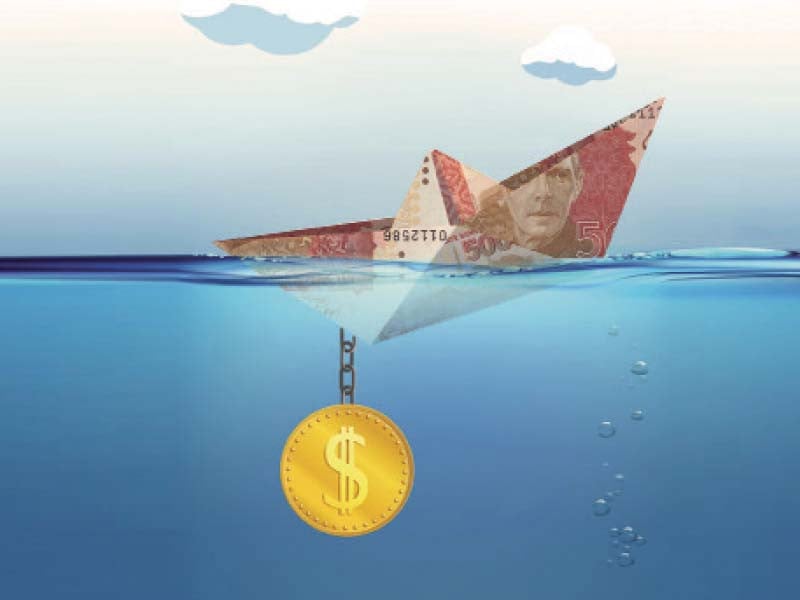By Salman Siddiqui
Published in The Express Tribune on May 23, 2023
KARACHI: The Pakistani currency experienced a sharp decline, dropping 1.31% or Rs4 in a single day, reaching a new all-time low at Rs305 against the US dollar on Monday. This downward trend has persisted over the past four working days, with the currency plummeting approximately 4% or Rs12, as reported by the Exchange Companies Association of Pakistan (ECAP).
Last week, the open market witnessed the largest single-day drop of Rs7.
The interbank market also saw a continued downtick in the local currency for the fourth consecutive working day, falling by 0.25% or Rs0.73 to a 11-day low of Rs286.55/$, according to the State Bank of Pakistan (SBP). Consequently, the spread between the rupee-dollar exchange rates in the interbank and open market has widened to Rs18. This gap used to be around Rs1-3 in recent days.
Speaking to The Express Tribune, ECAP, President, Malik Bostan attributed the renewed pressure on the domestic currency to the notable demand for US dollars from commercial banks. Banks are acquiring approximately $10 million per day from the open market to settle international payments made through credit cards by their clients.
Simultaneously, the supply of foreign currencies to exchange companies’ retail counters has decreased significantly due to the strengthening of black currency markets in Dubai and Afghanistan. Individual sellers in Dubai’s hawala-hundi markets are currently offered Rs310 against the US dollar, compared to Rs305/$ in the domestic open market and Rs286.55/$ in the interbank market.
Bostan also highlighted a visible decline of 29% in workers’ remittances, which reached Rs2.21 billion in April compared to the all-time high of $3.12 billion in the same month last year. This suggests that a section of overseas Pakistanis is now sending funds to their homeland through illegal channels.
Factors such as the persistent delays in the revival of the International Monetary Fund (IMF) loan programme, a continuous drop in foreign exchange reserves, increasing chances of default on foreign debt repayment, and political instability in the country are contributing to the mounting pressure on the rupee against the US dollar, he said.
Given the circumstances, Bostan stated that it is nearly impossible to project the outlook for the rupee-dollar exchange rate. Importers, facing difficulties in arranging import payments from the interbank market, are resorting to making small payments through credit cards. Many import orders are still pending central bank approval. Bostan noted that importers are making payments of around $5,000-10,000 per order, and they may be using multiple credit cards, including those of their family members, to conduct international transactions and sustain their small businesses.
The limit on outward remittances through credit cards was set last April, reducing the maximum payment to $30,000 per year. The ECAP president Bostan suggested that the government should further reduce this limit until the foreign exchange reserves are replenished.
With foreign exchange reserves critically low at $4.3 billion and $3.7 billion in foreign debt repayments due over the next six weeks until June 30, 2023, ECAP, Secretary General, Zafar Paracha added that people are buying Saudi riyals and US dollars for the upcoming Hajj pilgrimage. The first pilgrimage flight left the country last week, said Paracha.
Additionally, some individuals are engaging in panic buying of foreign currencies, exchanging rupees for dollars in advance to mitigate the risk of potential non-availability of the greenback amid further supply cuts and increased demand.
Financial experts, however, believe that the rupee-dollar exchange rate will likely remain range-bound and continue to hover around current levels in the interbank market until the end of June 2023. The government’s implementation of administrative controls to manage imports, along with low foreign exchange reserves and a high risk of default, has contributed to this outlook.






